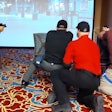
"Blue despair" is a potentially lethal mental disease that infiltrates the mind of spiritually wounded law enforcement officers (LEOs) and shatters their psyches. Unfortunately, there's no body armor to repel blue despair, but we can help triage the mental and emotional wounds before they become fatal. We start by recognizing that those who face unexpected separation from service due to an illness or injury are vulnerable to blue despair.
In "The Disabled Police Officer – Gone and Forgotten," Dr. John Violanti writes: "Police Officers lose more than their health when they become disabled; they lose their identity." While some in this situation may casually flip pages and move on to a new chapter in their lives, others may see this transition in identity as terminal. It's said, "There are no "ex-Marines." This same noble concept may be embraced by many LEOs, but with fatal consequences if disabled LEOs conclude their identity is at risk.
When a LEO separates from service due to a medical condition, it's not just a matter of variance in pay. It may represent a brutal seizure of his or her identity, leaving the LEO undefined and without purpose.
You may recall graduating from the academy and getting this advice from an old timer: "Hey, kid, don't let the job consume you." But the job does consume many of us. There is no better occupational reward than law enforcement camaraderie and being on the side of the angels gives us great purpose. Then one cruel day, we're told we can no longer perform the job, and we're lost. We all need to be aware and open about this and what it can do to us.
Former International Association of Chiefs of Police president and retired chief Craig Steckler wrote, "Our refusal to speak openly about (suicide) perpetuates the stigma many officers hold about mental health issues—the stigma that depression, anxiety, and thoughts of suicide are signs of weakness and failure, not cries for help."
Steckler is correct. If we treat blue despair like some form of alien plague and remain silent, we will be providing the ink in the pen used to sign a teammate's death warrant.
In addition to openly discussing this, we also need to act. If we see a mentally wounded teammate or know of one that has been separated from service, let's lead them to help. Our wounded teammates are more likely to call the IRS for tax advice than to reach out for help, so we need to do more than just point them in the right direction; we need to walk it with them. Make the call for a counseling appointment with them. Drive them to the VA or other counseling options. Be there and listen to them. In addition to being a good teammate, you might actually be providing a viable reason for your teammate to opt for sustained life.
While we attempt to help our teammates, we also have to recognize the common means employed when a LEO self-inflicts. What do you do about the firearm issue? You can speak to a counselor for advice or call Safe Call Now (crisis line for public safety officers). You may have to confront your teammate with this issue, and you will have earned credibility by being there for them. I don't believe snatching guns in general solves problems, but in this case, it might be a viable temporary option.
If a teammate separates from service and you don't see him regularly, call him and also pay attention to what you hear from others. I lost a brother LEO to suicide and had heard he was drinking a lot and seemed bitter. It's easy for me to try to placate myself for not reaching out since I'm so self-important and busy, but that doesn't wash. I can't rewind the clock and bring him back, but I can encourage my LEO teammates to discuss the severity of blue despair and avoid my mistake.
When the thought of suicide comes crashing through a LEO's mental door, it is always an uninvited, unforgiving home-invasion horror. There is no professional courtesy or a civil "Knock and Announce" before the thought of suicide pounces. Blue despair can kill quicker than Stage-4 cancer, but only if ignored.
So if you see a teammate who looks like they've been bum-rushed by blue despair, what's the best response: See something, say something? No, the answer is, if you "See someone hurting, DO something." Together we can combat the blue despair and pull our fellow LEOs out of the suicidal abyss.















